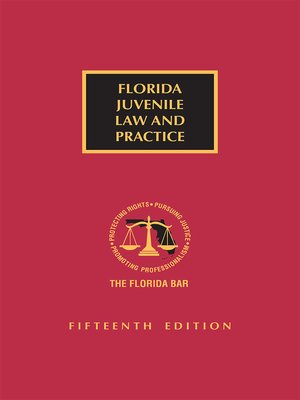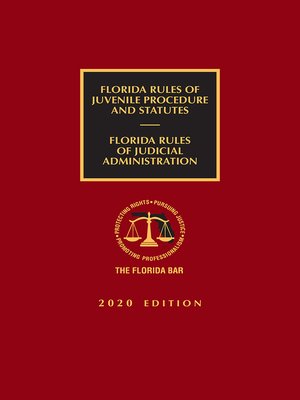Criminal Law Field Placement Clinic Resource Guide
Florida Statutes Chapter 985. Juvenile Justice; Interstate Compact on Juveniles
In Florida, juvenile delinquency proceedings are governed by the Chapter 985, Florida Statutes and the Florida Rules of Juvenile Procedure. Distinct from it's adult counterpart, juvenile delinquency and the Florida juvenile justice system focuses primarily on treatment and rehabilitation rather than punishment. Legal terminology, timing rules, additional parties involved (DJJ, CEPAS, etc.), court procedure and much more are all different in juvenile delinquency. Still, elements of the charges and their defenses are the same. These divisions do not have jury trials. Instead, all trials are bench trials and held in front of the presiding judge. Use the below resources to familiarize yourself with the Florida statutes and rules governing juvenile delinquency proceedings.
Florida Juvenile Delinquency Benchbook
This clickable and easily navigable text is provided by the Florida Department of Juvenile Justice (DJJ) to give Florida judges an outline of the juvenile delinquency process. It is a concise reference tool that summarizes every step of the juvenile delinquency case. Most helpful to CLI's in the program will be the the Overview of the Juvenile Delinquency Process (p.1) and List of Commonly Used Acronyms (p. 3). Breakdowns of the different types of juvenile hearings are also provided. Browse this text to get a foundational understanding of juvenile delinquency proceedings.
-
Juvenile Delinquency FlowchartA flowchart of a juvenile delinquency case from petition to disposition.
Treatises and Annotated Rules
-
West Florida Practice Series Chapter 11. Juvenile SentencingView the full Table of Contents on the left-hand side of this section page to find links to common juvenile justice topics from detention to disposition.
-
 Florida Juvenile Law And Practice
by
The Florida Bar Continuing Legal Education
Call Number: Available via Lexis Digital.Publication Date: 11/20/2020Florida Juvenile Law and Practice provides comprehensive coverage of all areas of juvenile practice including delinquency, dependency and termination of parental rights, and families and children in need of services. Authoritative and insightful analysis from authors that include members of the Juvenile Court Rules Committee, assistant state attorneys, assistant public defenders, attorneys representing the Department of Children and Family Services, and private attorneys makes this book an essential reference for those practicing in this area of the law.
Florida Juvenile Law And Practice
by
The Florida Bar Continuing Legal Education
Call Number: Available via Lexis Digital.Publication Date: 11/20/2020Florida Juvenile Law and Practice provides comprehensive coverage of all areas of juvenile practice including delinquency, dependency and termination of parental rights, and families and children in need of services. Authoritative and insightful analysis from authors that include members of the Juvenile Court Rules Committee, assistant state attorneys, assistant public defenders, attorneys representing the Department of Children and Family Services, and private attorneys makes this book an essential reference for those practicing in this area of the law. -
 Florida Rules of Juvenile Procedure and Rules of Judicial Administration
by
The Florida Bar Continuing Legal Education
Call Number: Available via Lexis Digital.Publication Date: 02/14/2020This latest edition of Florida Rules of Juvenile Procedure and Statutes and Rules of Judicial Administration, 2020 Edition is a handy go-to reference that every practitioner who deals with juveniles should keep close at hand. It features the full text of the Rules of Judicial Administration and the full text of the Florida Rules of Juvenile Procedure, with the committee notes, rule histories, and statutory and rule references for each rule. It also includes critical blackletter law from the Florida Statutes and Constitution, including Chapter 39, Proceedings Relating to Children, Chapter 984, Children and Families in Need of Services, and Chapter 985, Interstate Compact on Juveniles. Tables of contents in each section and full indexing help you find the material you need quickly and easily.
Florida Rules of Juvenile Procedure and Rules of Judicial Administration
by
The Florida Bar Continuing Legal Education
Call Number: Available via Lexis Digital.Publication Date: 02/14/2020This latest edition of Florida Rules of Juvenile Procedure and Statutes and Rules of Judicial Administration, 2020 Edition is a handy go-to reference that every practitioner who deals with juveniles should keep close at hand. It features the full text of the Rules of Judicial Administration and the full text of the Florida Rules of Juvenile Procedure, with the committee notes, rule histories, and statutory and rule references for each rule. It also includes critical blackletter law from the Florida Statutes and Constitution, including Chapter 39, Proceedings Relating to Children, Chapter 984, Children and Families in Need of Services, and Chapter 985, Interstate Compact on Juveniles. Tables of contents in each section and full indexing help you find the material you need quickly and easily.
Detention Hearings
Within 24 hours of a juvenile's detainment (juvenile term for arrest/incarceration), the juvenile (also commonly referred to as "child" or "youth") will be subject to a detention hearing. Juvenile detention is the "the temporary care of a child in secure or supervised release detention, pending a court adjudication or disposition or execution of a court order.” F.S. 985.03(18). 1 Florida Juvenile Law and Practice § 4.6.A (2020). Detention Hearings will standardly be the first interaction prosecutors and defense attorneys have with their case, sometimes even before a petition (juvenile charging document) is filed. Review the below resources to familiarize yourself with the levels of detention and criteria for meeting each.
-
DJJ - Supervised Release ProgramsVisit this site to locate options for supervised release for juveniles within your jurisdiction.
-
DRAI Training Webinar (Youtube)50 minute training video on the DRAI. The webinar provides a brief history as well as an explanation of how to read and what information goes into preparing a DRAI.
Disposition/Sentencing
"The primary purpose of juvenile sentencing in Florida is remedial. This is in contrast with adult sentencing, in which the primary goal is punishment. It is also a reflection of progressive evolution from the common law, under which children were generally prosecuted as adults, although they were able to assert the defense of incapacity by reason of infancy. As a result of this evolution, Florida sentencing law makes sharp distinctions between children and adults." 25 Fla Jur Family Law § 466. It is imperative that those practicing in juvenile divisions become familiar with disposition and sentencing procedures; especially the differing requirements of the various levels of probation, community control, and commitment.
- Last Updated: Aug 14, 2024 12:46 PM
- URL: https://libguides.nova.edu/CLFPC
- Print Page

